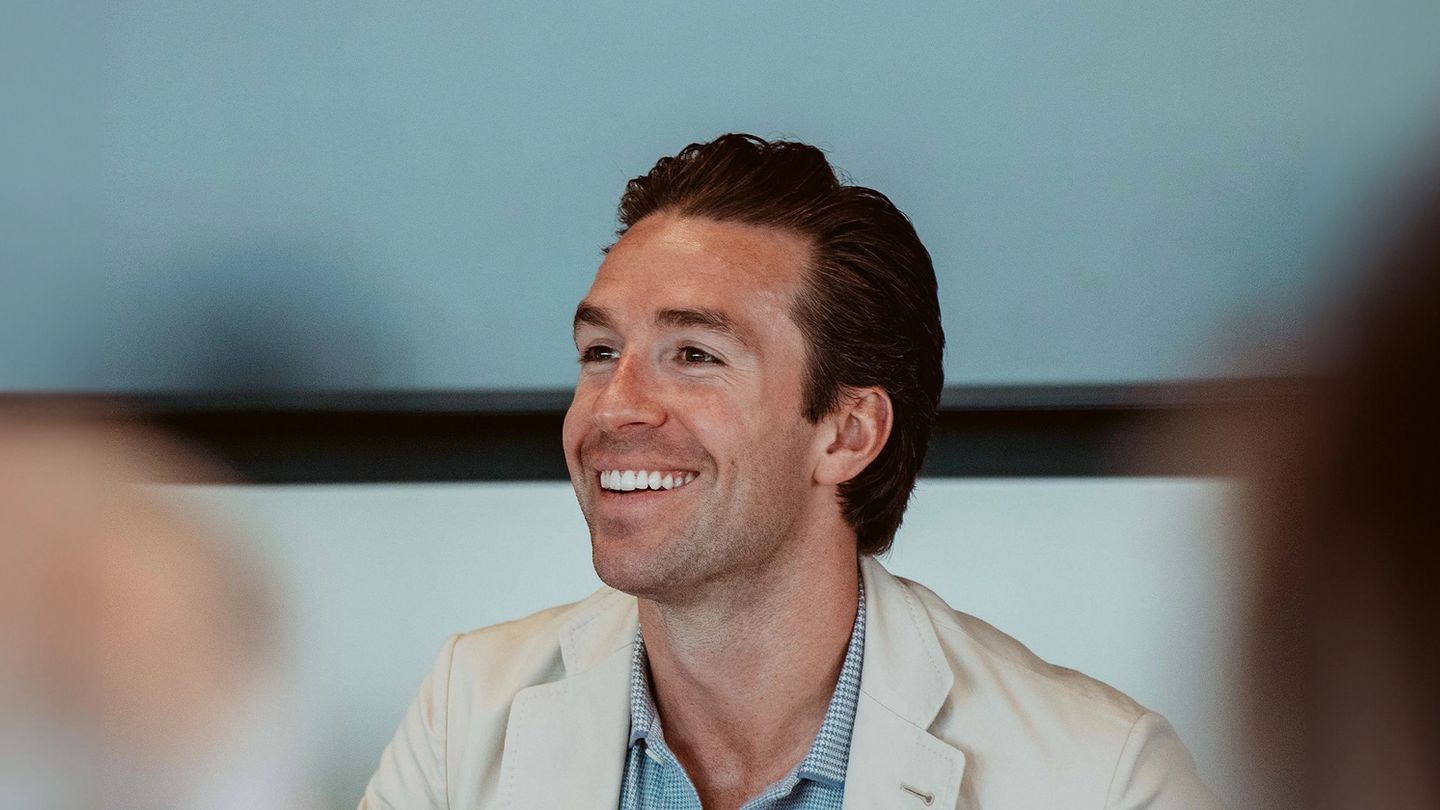

Michael Murray on how everything changed at the Frasers Group
‘With Frasers, we wanted to make something different… we decided to make it a global brand’
Words: Michael Murray
Lead image: George Power Finch
Michael Murray became the CEO of Frasers Group in May, 2022, at the impressively young age of 33. He now leads a portfolio of some of Britain’s best-known retail brands, including House of Fraser, Sports Direct, Flannels and Jack Wills. Here, he explains how his childhood shaped him, discusses how he continues to take Frasers Group to new heights of profit, and talks about the state of business in Britain today.
I grew up from humble beginnings in Doncaster. I was quite fortunate to go to a small prep school, but my parents struggled. They couldn’t really afford it, but they had great ambitions for me. I’d go home wearing a bright-maroon blazer in the middle of a council estate, so I stuck out like a sore thumb. My dad was a bricklayer and he was super ambitious himself. He wanted the best for me and to push me as hard as he possibly could. I feel I’ve experienced all sorts of different forms of life, which has shaped who I am today – like going to amateur boxing clubs from a very young age. An amateur boxing club in Doncaster is a bit of a working-men’s club. I had broad experiences from such a young age.
I wasn’t necessarily an academic. I went from my previous school with quite average grades, and I left with three As. I wasn’t on a scholarship – I had to win at sport, or I had to get my grades.
I knew I was an entrepreneur from a young age. I wanted a pair of jeans and my dad made me work at the car wash. After three weeks, I had enough money. But it was far too much hard work. So, I started doing events. I was 15 and was making a couple of thousand pounds off each GCSE results event. When I went to a new school, in Leeds, I was doing them for the A-level results. I ended up trying to take on all the public schools around the north.
There was a realisation after university that the returns in real estate were significant. I had no student loan, I had money in the bank, and I decided to invest. One year after graduating, I started buying houses, flats and blocks, doing them up and converting them. That’s when I got into the property side.
A background in both property and retail was useful. We would buy buildings with two or three years of lease left to go to another tenant, knowing that Sports Direct was going to take the space anyway. A normal investor would say: “We’re not sure what will happen in those three years, and there’s a risk the tenant might move.” But we could underwrite the risk with ourselves. When BHS went bankrupt, we could buy the businesses for virtually nothing and then reinvest and put Sports Direct there. The same goes with development projects. We could anchor these schemes and develop our own retail blocks.
With Frasers, we wanted to make something different. After 35 years, we decided we were going to change the Frasers business to a global brand. So, we had to change the way we did everything: people, departments, work, the market, how we sell. We also wanted to make sure that if we were going to do this transformational change, we did it once. We diversified, and we wanted to work with the world’s best aspirational brands, but still keep the business simple. We have the sports brands, we have premium brands with House of Fraser and Frasers, and we have luxury with Flannels. Within those three segments, you’ve got access to the world’s best brands on the one platform, which is Frasers Group.
Three pillars is our approach. It all fits together. Our first pillar is: “Is it going to give us access to better brands or more of our own brands?” We’ve been buying brands for decades. Mike Ashley [owner of Sports Direct] bought Slazenger, Dunlop and Everlast. We bought Jack Wills and Gieves & Hawkes. The second pillar is our platform: “Is it going to give us scale or capability that we don’t currently have?” When we bought Studio Retail, it came with a consumer finance proposition which was regulated. We were able to carve off the finance piece and put it across the other brands – it became part of our shared services and our platform. The third pillar is our channel: “Is it a sports channel? Is it a premium channel? Or is it a luxury channel?” All these acquisitions form part of our ecosystem, which we created over the past five or six years. Instead of Sports Direct being at the mercy of a few brands, we’ve got a fully diversified portfolio that can capitalise on different trends.
I understand the market beyond London. It gives me a real understanding of regional consumers and regional people that global brands don’t know about. Global brands haven’t heard of Doncaster or Sheffield – but Sheffield is in the top 10 cities in the UK, as is Glasgow. But global brands don’t have the capital, so they place their bets on the big cities and Doncaster is not on that list. Our strategy is simply to open beautiful sports and premium stores in 100 locations around the country and act as a platform for those brands to reach their consumers. We take so much for granted in London and it’s shocking, because the premium offering we bring to the rest of the UK has not been present.
This feature was taken from Gentleman’s Journal’s Winter 2023 issue. Read more about it here.
Want more from the issue? Here’s our cover interview with Bryan Cranston…


